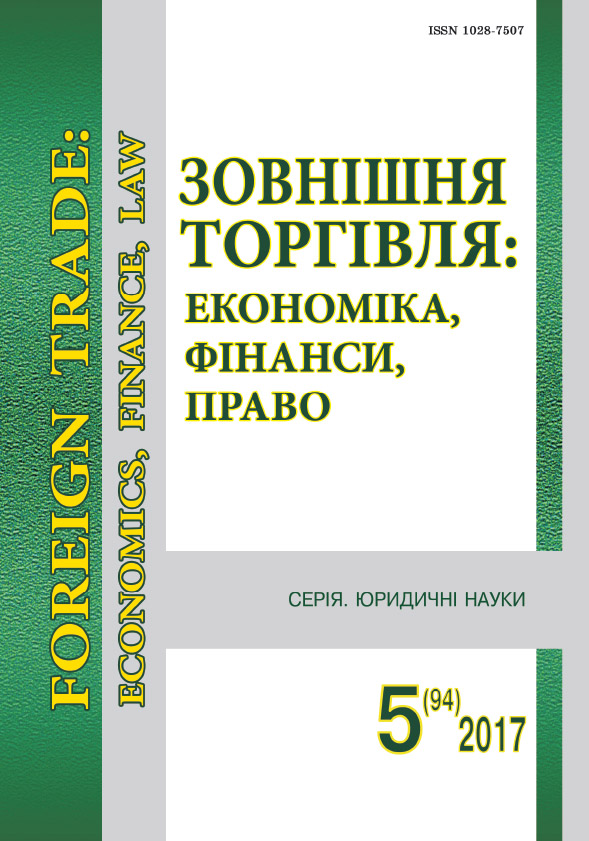The custom of business turnover as a means of self-regulation of economic activity
Keywords:
self-regulation, economic activity, self-regulation of economic activities, a means of self-regulation, the custom of business turnover (for trade), an innovative legal technology, Lex mercatoria, soft lawAbstract
Background. The leading place among the means of self-regulationof economic activity is the custom of business turnover, the activation of which is currently being investigated, which is primarily due to the processes of progressive codification of commercial transactions.
Analysis of recent research and publications. The study of the question of the compositional combination of the custom of trade as a means of self-regulation requires further exploration and argumentation.
Materials and methods. It was applied general scientific and special methods of knowledge of legal phenomena. The main methods used in the work should include: dialectical, systematic approach, formal-logical, system-functional, and generalization. The information base of the study is the Constitution of Ukraine, current laws of Ukraine, international treaties; Incoterms Rules, Principles, Rules and Requirements Lex mercatoria CENTRAL, scientific works of domestic and foreign scientists.
The results of the research. The characteristic of tenseness of the custom of business turnover as a means of self-regulation of economic activity is manifested in two aspects: 1) the formation of the final expressiveness of the custom is a consequence of the constant practical activity of the subjects of self-regulation in certain branches of the economy; 2) the prevailing custom can be used by other subjects of self-regulation of economic activity as an unified, established system of norms for the most subjects of self-regulation in this industry.
As a means of self-regulation of economic activity, the custom of business turnover (for trade) is a system of formalized (non-formalized) well-established, sufficiently widespread and well-known to stakeholders self-regulatory norms that are not legally binding, are not provided with the state compulsion and are applied voluntarily as a result of the credibility of self-organizations (with certain exceptions) that have created-codified.
Conclusion. The role of custom as a means of self-regulation of economic activity at the beginning of the XXI century is extremely important. Uniformity, steadiness, autonomy of the custom of business turnover (trade) promote to the widespread and use of its subjects of self-regulation. At the same time, the dynamism of a custom, this manifests itself in making useful changes to already existing customary rules or in codifying new customs reflected in activities including self-regulatory organizations, is designed to ensure the efficiency, expediency and timeliness of legal regulation of economic activity.
References
Bakalins'ka O. O. Pravovi problemy rozvytku samoreguljuvannja v sferi dobrosovisnoi' konkurencii' Ukrai'ny. Pravo i suspil'stvo. 2014. № 2. S. 63–69.
Beljanevych O. A. Pytannja samoreguljuvannja gospodars'koi' dijal'nosti. Ctabil'nist' cyvil'nogo oborotu v Ukrai'ni: problemy zabezpechennja. Zb. nauk. prac'. Vyp. 4 ; za red. O. A. Beljanevych. Kyi'v : NDI pryvatnogo prava i pidpryjemnyctva NAPrN Ukrai'ny, 2016. 200 s.
Kologojda O. Samoreguljuvannja profesijnoi' dijal'nosti fondovogo rynku. Visn. Kyi'v. nac. un-tu imeni Tarasa Shevchenka. 2012. Vyp. 92. S. 109–112. (Serija : Jurydychni nauky).
Poljuhovych V. I. Derzhavne reguljuvannja fondovogo rynku Ukrai'ny: gospodars'kopravovyj mehanizm. Kyi'v : NDI pryvatnogo prava i pidpryjemnyctva NAPrN Ukrai'ny, 2012. 337 s.
Kuznecova N. Komentar do Glavy 1 // Naukovo-praktychnyj komentar Cyvil'nogo kodeksu Ukrai'ny: u 2 t. ; za red. O. V. Dzery (ker. avt. kol.) ; 3-je vyd., pererobl. i dopov. Kyi'v : Jurinkom Inter, 2008. T. 1. 832 s.
Mizhnarodne pryvatne pravo. Zagal'na chastyna ; za red. A. S. Dovgerta i V. I. Kysilja. Kyi'v : Alerta, 2012. 376 s.
Kolomac'ka S. P. Transnacional'ne torgove pravo. Kyi'v : Kyi'v. Nac. torg.ekon. un-t, 2015. 204 s.
Mahinchuk V. M. Pryvatnopravove reguljuvannja pidpryjemnyc'kyh vidnosyn v Ukrai'ni. Kyi'v : Jurinkom Inter, 2013. 320 s.
Tytarchuk O. A. Zvychaj i pravo (pytannja vzajemozv’jazku i vzajemodii') : avtoref. ... kand. juryd. nauk: spec. 12.00.01 – Teorija derzhavy i prava. Harkiv, 1995. 15 s.
Cololo V. V. Suchasna koncepcija lex mercatoria. Aktual'ni problemy suchasnogo mizhnarodnogo prava : zb. nauk. st. z materialamy I Hark. mizhnar.-prav. chytan', prysv. pam’jati prof. M. V. Janovs'kogo i V. S. Semenova (Harkiv, 27.11.2015) : u 2 ch. redkol.: A. P. Get'man, I. V. Jakovjuk, V. I. Samoshhenko ta in. Harkiv : Pram, 2015. Ch. 2. 500 s.
Goncharenko O. Vydy samoreguljuvannja gospodars'koi' dijal'nosti. Pidpryjemnyctvo, gospodarstvo i pravo. 2016. № 11. S. 68–72.
Uolker R. Anglijskaja sudebnaja sistema ; per. s angl. M. : Jurid. lit., 1980. 631 s.
David R., Zhoffre-Spinozi K. Osnovnye pravovye sistemy sovremennosti ; per. s fr. V. A. Tumanova. M. : Mezhdunar. otnoshenija. 1996. 400 s.
Zvid pryncypiv, pravyl i vymog Lex mercatoria CENTRAL. URL : http//www.central.vuni-koeln.de/index.php.
Peters A., Pagotto I. Soft Law as a New Mode of Governance: A Legal Perspective // NEWGOV : New Modes of Governance. 2006. P. 7. URL : http://ssrn.com/abstract=1668531.
Vysockij A. F., Kotigorenko N. V. Inko-terms–2000: pravovaja priroda i neko-torye voprosy primenenija. Pravila Inkoterms–1990/2000. Kommentarii i analiticheskie materialy. Kiev : Justinian, 2002. S. 5–13.
Guralenko N. A. Funkcional'na rol' zvychaju v konteksti garmonizacii' suchasnogo prava. Nauk. visn. L'viv. derzh. un-tu vnutr. sprav. 2011 (1). S. 192–202.



